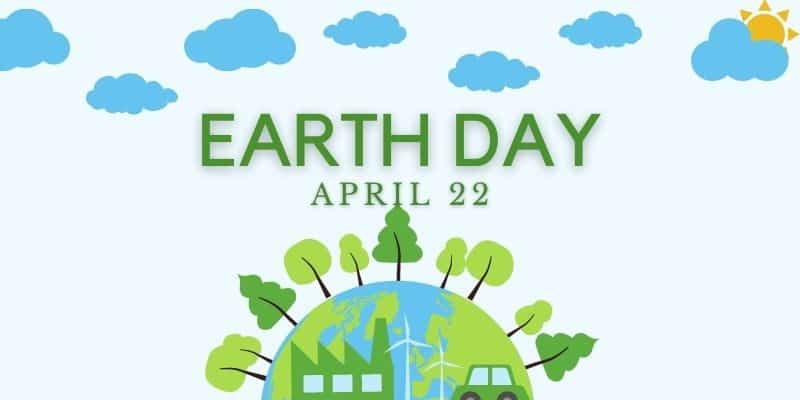By Children’s Librarian Eileen Saam
Every year on Earth Day, April 22, we celebrate our precious planet. Check out ways you can celebrate and protect our planet at the same time below! And find seven more ways for all ages to get involved this Earth Day »
Check out these digital titles & videos to learn more
To protect our Earth, home to so many amazing creatures, it helps to reflect on what we are doing to create a healthy planet. To curb climate change, it’s important to take action.
Check out digital titles—available from Hoopla and Media on Demand/Libby—and videos to learn how about ways you can take action to make a difference.
What is Earth Day?
- Earth Day by Melissa Ferguson (ages 6-9): Readers will discover how a shared holiday can have multiple traditions and be celebrated in all sorts of ways.
- Let’s Celebrate Earth Day by Barbara Derubertis (ages 9-12): Learn about why this important holiday was created and about the many little things we can do to make big changes in the health of our planet. Read-along option.
How can we protect our planet?
- This Little Environmentalist: A Love-The-Earth Primer by Joan Holub (ages 3-5): Learn all about big leaders who love and protect the Earth in this engaging and inspiring board book perfect for environmentalists-in-training!
- Protecting Our Planet by Lisa Amstutz (ages 5-8): Photo-filled science book for beginning readers explains how human activities are threatening the health of our planet, and how kids can help protect it!
- Working Toward Protecting the Planet by Cynthia O’Brien (ages 9-12): Looks at the impact of environmental activists, today often led by young voices, such as Swedish school student Greta Thunberg and groups such as Extinction Rebellion.
What can we do about waste?
Can we reuse or repurpose items instead of buying new things? Can we donate or recycle items instead of throwing them in the garbage and adding to landfills? It’s especially important to ask these questions when it comes to our unwanted electronic gadgets.
We don’t want old electronics going into landfills, because there are a number of hazardous substances contained in our electronic gadgets like lead and mercury. If we throw out an old television, computer, or cell phone, we create e-waste, which leaks these harmful toxins into the soil, water, and air. In fact, it is against the law to dispose of most electronics in landfills.
To learn more about this important topic, check out these digital titles:
- E-Waste in Guiyu, China by Shannon Berg (ages 8-12): Understanding what “e-waste” means and how Guiyu, China was affected by it.
- What a Waste by Jess French (ages 10-13): Everything you need to know about what we’re doing to our environment, good and bad, from pollution and litter to renewable energy and recycling.
And watch these eye-opening videos on e-waste:
- What is E-WASTE Pollution? | What Causes Electronic Waste? | The Dr Binocs Show | Peekaboo Kidz
- How Can We Fix the Massive E-Waste Problem?
Instead of creating e-waste: Donate, recycle, reuse or trade in old electronics
Now that you’ve learned about the importance of protecting our planet and what e-waste is, below you’ll find a few ideas on what you can do with your old electronics.
Donate your unused electronics
Your unwanted but working electronics can be donated to individuals and organizations who greatly appreciate them. Here are two reputable organizations to donate your unwanted electronics to:
For more information about donating electronics to charitable organizations, check out these two articles:
- “Places to Donate Used Computers, Monitors, Printers, and TVs“
- “Where to Donate Your Old Computers & Used Electronics to Charity“
Before donating any of your personal electronics:
- Protect your personal data by backing it up and wiping your phone or computer of all contacts, passwords, etc.
- Sign out of accounts like Google and iCloud.
- Do a factory reset.
For more suggestions, this article by Reader’s Digest has a list of instructions on what to do before donating or recycling your device.
Recycle or e-cycle your unusable electronics
When your electronic devices and accessories stop working properly and are unusable, recycling them is probably the best option!
E-cycling not only protects our environment from harmful toxins; it also helps conserve natural resources like gold, copper, and aluminum. Check out this video on Kanopy Kids, which shows how electronics are recycled: E-Waste.
Where can I recycle electronics? You can schedule a pickup or drop off of your old electronics to a variety of organizations and businesses for recycling. Check out these e-cycling options in Illinois and Oak Park:
Many companies offer trade-in options for your electronics! Check out the E-cycling options available on EPA’s website: Environmental Protection Agency: Electronics Donation and Recycling.
Join us for an Earth Day Program at the Main Library
Earth Day Upcycle Crafts Program
Friday, April 22, 3:30-5 pm, Main Library Storytime Room. Turn trash into treasure and keep items, especially plastics, out of the landfills by upcycling them! Kids ages 6-12 and their families can make:
- Colorful jewelry from plastic bags
- Fun planters from plastic bottles and newspapers
- Cool desk organizers from cardboard tubes
- Nature-inspired refrigerator magnets from bottle caps.

About Eileen
Eileen Saam is a children’s digital learning librarian who loves discovering new things, learning from others, and sharing with children the joy and wonder of books. One of her favorite things to do at the library is to help children, families, and teachers find books and digital resources that delight and inspire them.

